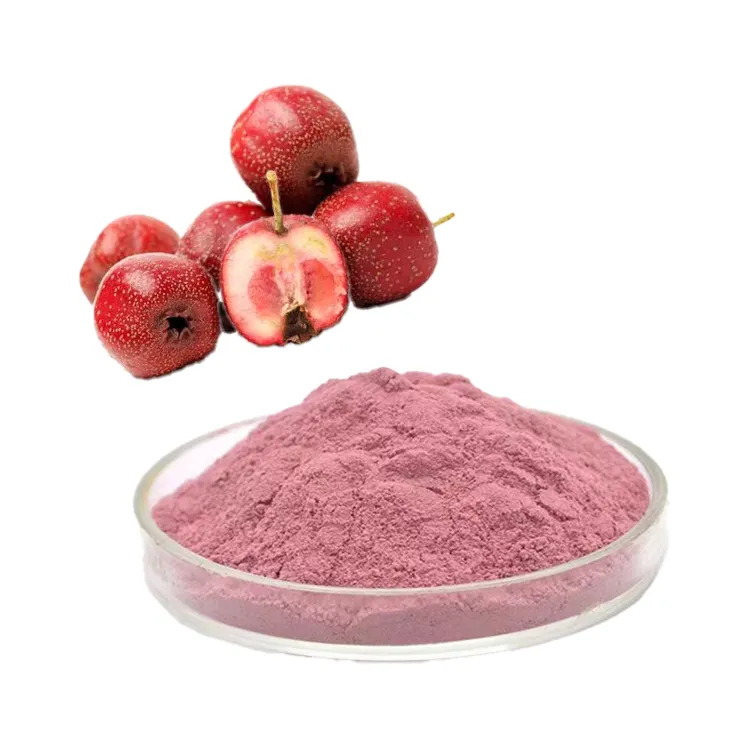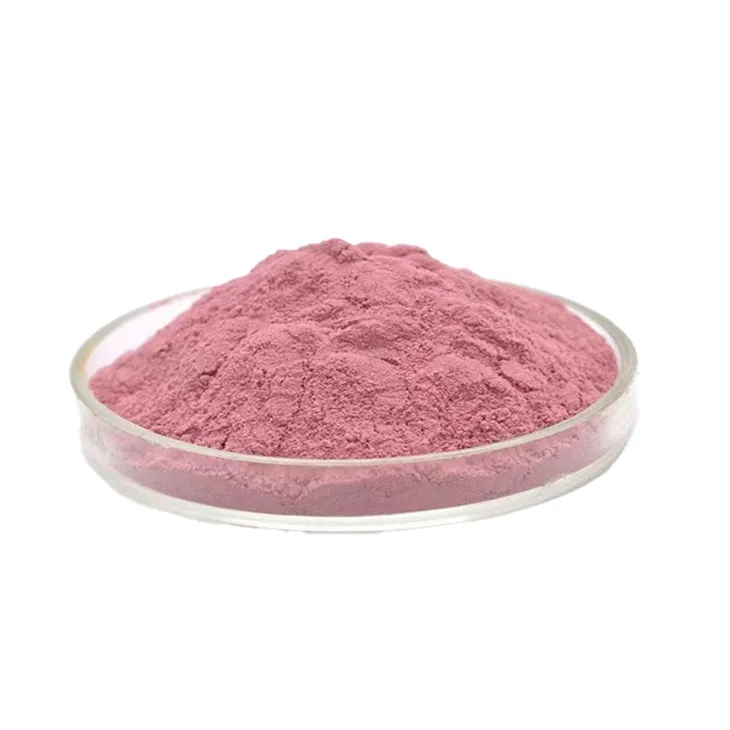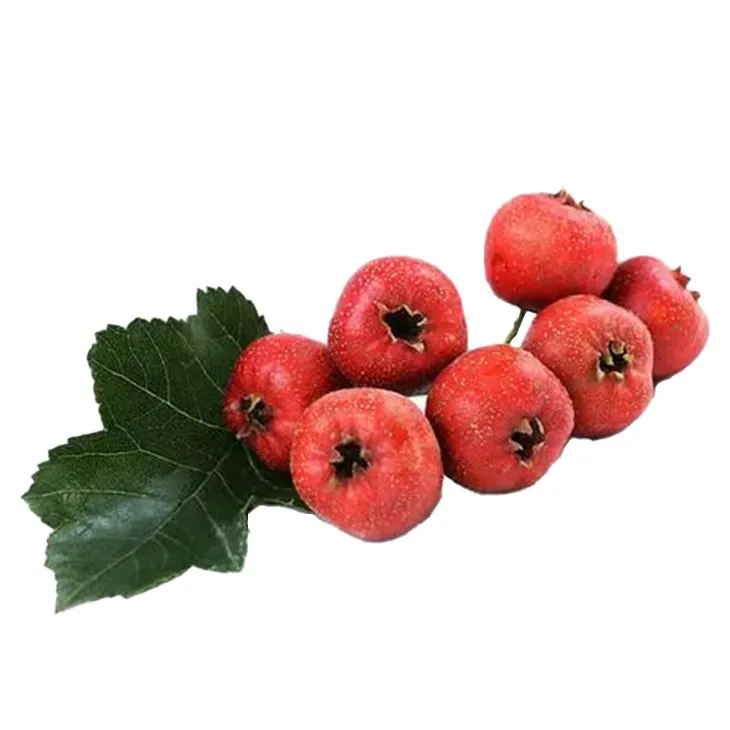- 0086-571-85302990
- sales@greenskybio.com
Hawthorn powder: What are its benefits and how to take it?
2024-11-12

1. Introduction to Hawthorn powder
Hawthorn powder is a product derived from the hawthorn fruit. The hawthorn tree, scientifically known as Crataegus, is native to many regions around the world. Hawthorn fruits have been used in traditional medicine for centuries, and with modern processing techniques, they are made into powder form for easier consumption and wider application.

2. The Benefits of Hawthorn powder
2.1 Digestive Aid
One of the significant benefits of hawthorn powder is its role in aiding digestion. It contains compounds that can stimulate the production of digestive enzymes in the body. These enzymes play a crucial role in breaking down food, making it easier for the body to absorb nutrients. For example, it can help in the digestion of proteins, fats, and carbohydrates. In addition, hawthorn powder can also improve the function of the gastrointestinal tract by promoting regular bowel movements and reducing symptoms of indigestion such as bloating, flatulence, and stomach discomfort.
2.2 Stress Relief
Hawthorn powder has properties that can contribute to stress relief. In modern life, stress has become a common problem that can affect both physical and mental health. Hawthorn powder contains certain bioactive substances that can have a calming effect on the nervous system. It may help regulate the body's stress response by reducing the levels of stress hormones such as cortisol. By reducing stress, it can also have a positive impact on related health issues such as high blood pressure, which is often exacerbated by chronic stress.
2.3 Antioxidant Properties
Antioxidants are substances that can protect the body from oxidative damage caused by free radicals. Hawthorn powder is rich in antioxidants, including flavonoids, phenolic acids, and proanthocyanidins. These antioxidants can neutralize free radicals, which are unstable molecules that can damage cells, DNA, and proteins in the body. By preventing oxidative damage, hawthorn powder may play a role in reducing the risk of various chronic diseases such as heart disease, cancer, and neurodegenerative diseases. Moreover, antioxidants can also contribute to maintaining healthy skin by reducing signs of aging such as wrinkles and fine lines.
2.4 Heart Health
Hawthorn powder is beneficial for heart health. It can help improve blood circulation by dilating blood vessels. This allows for better blood flow throughout the body, reducing the risk of cardiovascular problems such as heart attacks and strokes. Additionally, it can help regulate blood pressure. High blood pressure is a major risk factor for heart disease, and hawthorn powder's ability to lower blood pressure in a natural way makes it a valuable addition to a heart - healthy lifestyle. It may also help reduce cholesterol levels in the blood, further protecting the heart and blood vessels.
2.5 Immune System Boost
The nutrients and bioactive compounds in hawthorn powder can also give a boost to the immune system. A strong immune system is essential for fighting off infections and diseases. Hawthorn powder contains vitamins, minerals, and other substances that can support the function of immune cells. For instance, it may enhance the activity of white blood cells, which are the body's first line of defense against pathogens. This can help the body better resist common illnesses such as colds and flu.

3. How to Take Hawthorn Powder
3.1 As a Tea
- Prepare the hawthorn powder. You can purchase high - quality hawthorn powder from a reliable source.
- Take about 1 - 2 teaspoons of hawthorn powder and place it in a cup or teapot.
- Pour hot water (about 200 - 250 ml) over the powder. The water temperature should be around 80 - 90 degrees Celsius.
- Let it steep for about 5 - 10 minutes. This allows the beneficial compounds in the powder to be extracted into the water.
- Strain the tea if there are any undissolved particles. You can then enjoy the hawthorn tea. You may add a little honey or lemon juice according to your taste.
3.2 In Smoothies
- Choose your favorite fruits for the smoothie. This could include bananas, strawberries, blueberries, etc.
- Add about 1 - 2 tablespoons of hawthorn powder to the blender along with the fruits.
- Pour in some liquid such as milk (dairy or non - dairy), yogurt, or fruit juice. The amount can be adjusted according to your desired consistency.
- Blend all the ingredients together until smooth. The hawthorn powder will blend well with the fruits and liquid, adding its unique flavor and health benefits to the smoothie.
3.3 In Baked Goods
Hawthorn powder can also be incorporated into baked goods. For example:
- If you are making muffins, you can add a small amount (about 1 - 2 teaspoons per batch) of hawthorn powder to the dry ingredients such as flour, baking powder, and sugar. Then follow the normal muffin - making process.
- When making bread, you can do the same. Add hawthorn powder to the dough mixture. This not only adds a new flavor but also infuses the baked goods with the health benefits of hawthorn powder.
3.4 Capsule Form
Some hawthorn powder is available in capsule form. If you choose to take it in capsules:
- Follow the recommended dosage on the product label. Usually, the dosage may vary depending on the concentration of the powder in the capsules and the intended health benefits.
- Take the capsules with a glass of water. It is best to take them at the same time each day to ensure consistent intake of the beneficial compounds.

4. Precautions and Considerations
4.1 Dosage
While hawthorn powder offers many health benefits, it is important to pay attention to the dosage. Taking excessive amounts may lead to potential side effects. The appropriate dosage may vary depending on factors such as age, health condition, and the specific purpose of taking it. It is advisable to consult a healthcare professional or a nutritionist to determine the proper dosage for you.
4.2 Allergies
Some people may be allergic to hawthorn. Allergic reactions can range from mild symptoms such as skin rashes and itching to more severe symptoms like difficulty breathing and swelling of the face, lips, or tongue. If you have a known allergy to plants in the Rosaceae family (which hawthorn belongs to), or if you experience any allergic symptoms after taking hawthorn powder, discontinue use immediately and seek medical attention.
4.3 Interaction with Medications
Hawthorn powder may interact with certain medications. For example, it may enhance the effects of blood - thinning medications, increasing the risk of bleeding. If you are taking medications, especially those for heart conditions, blood pressure, or blood - thinning, it is crucial to inform your doctor before starting to take hawthorn powder. Your doctor can assess the potential interactions and adjust your treatment plan if necessary.

5. Conclusion
Hawthorn powder has a wide range of benefits, from aiding digestion and relieving stress to providing antioxidant protection and promoting heart health. There are various ways to take it, whether as a tea, in smoothies, in baked goods, or in capsule form. However, it is important to be aware of the precautions such as proper dosage, potential allergies, and interactions with medications. By using hawthorn powder in a safe and appropriate way, it can be a valuable addition to a healthy lifestyle.
FAQ:
Question 1: Can hawthorn powder help with weight loss?
While hawthorn powder can aid digestion, there is no direct evidence to suggest it is a magic solution for weight loss. However, by promoting better digestion, it may assist in a more efficient metabolism which could potentially be beneficial in a weight management plan. But it should not be relied upon solely for weight loss.
Question 2: Is it safe to take hawthorn powder every day?
For most people, taking hawthorn powder in moderation every day is safe. However, some individuals may be allergic to hawthorn. Also, if you are on certain medications, especially those for heart conditions, it's advisable to consult a doctor before regular use, as hawthorn can interact with some medications.
Question 3: How much hawthorn powder should I take?
The appropriate amount of hawthorn powder to take can vary depending on individual needs and health conditions. As a general guideline, starting with 1 - 2 teaspoons per day is common. But for those with specific health concerns or those who are considering higher doses for a particular purpose, it's best to consult a healthcare provider.
Question 4: Can hawthorn powder lower blood pressure?
There is some evidence to suggest that hawthorn may have a mild effect on blood pressure. It may help relax blood vessels, which could contribute to a slight reduction in blood pressure. However, it should not be used as a substitute for medical treatment for high blood pressure, and anyone with hypertension should consult their doctor before using hawthorn powder.
Question 5: Does hawthorn powder have any side effects?
Some possible side effects of hawthorn powder include stomach upset, nausea, or allergic reactions in some sensitive individuals. If you experience any adverse effects after taking hawthorn powder, stop use immediately and consult a healthcare professional.
Related literature
- The Health Benefits of Hawthorn: A Review of the Evidence"
- "Hawthorn in Traditional and Modern Medicine"
- "Antioxidant Properties of Hawthorn: A Comprehensive Study"
- ▶ Hesperidin
- ▶ Citrus Bioflavonoids
- ▶ Plant Extract
- ▶ lycopene
- ▶ Diosmin
- ▶ Grape seed extract
- ▶ Sea buckthorn Juice Powder
- ▶ Fruit Juice Powder
- ▶ Hops Extract
- ▶ Artichoke Extract
- ▶ Mushroom extract
- ▶ Astaxanthin
- ▶ Green Tea Extract
- ▶ Curcumin
- ▶ Horse Chestnut Extract
- ▶ Other Product
- ▶ Boswellia Serrata Extract
- ▶ Resveratrol
- ▶ Marigold Extract
- ▶ Grape Leaf Extract
- ▶ New Product
- ▶ Aminolevulinic acid
- ▶ Cranberry Extract
- ▶ Red Yeast Rice
- ▶ Red Wine Extract
-
Jujube Extract
2024-11-12
-
Hericium erinaceus extract powder
2024-11-12
-
Shikonin
2024-11-12
-
Saponin Extract
2024-11-12
-
Lily extract
2024-11-12
-
Kupilu Extract
2024-11-12
-
Eyebright Extract
2024-11-12
-
Beetroot Powder
2024-11-12
-
Bitter Melon Extract
2024-11-12
-
White Peony Extract
2024-11-12





















